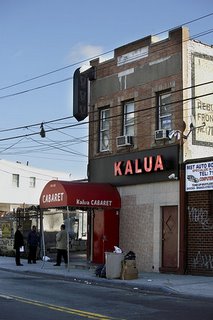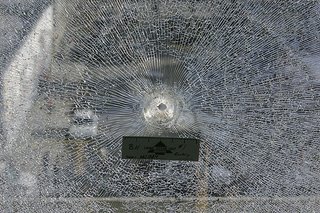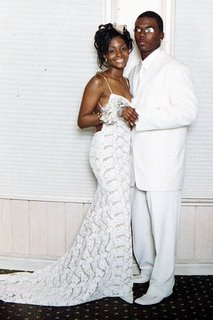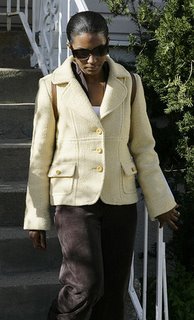Scenes from an aftermath
Saturday's shooting in Queens dominates local news here in New York City... Comparisons are immediately drawn with the 1999 shooting of Amadou Diallo in the Bronx by cops who fired 41 shots at the unarmed African immigrant. But many things have changed since then, not least, the mayor, who is no longer prize asshole Rudy Giuliani, but the rather more skillful and perhaps even humane, politician, Michael Bloomberg. Here are some scenes from the aftermath.
 The club (above) where an undercover cop, believing a group of guys were going to nearby Liverpool Street get guns from their cars to do some damage, fatefully radios for back-up, saying: "It's getting hot on Liverpool for real." I have to confess that though I tried to have a drink in every licensed establishment in the five boroughs, Club Kalua is one I missed.
The club (above) where an undercover cop, believing a group of guys were going to nearby Liverpool Street get guns from their cars to do some damage, fatefully radios for back-up, saying: "It's getting hot on Liverpool for real." I have to confess that though I tried to have a drink in every licensed establishment in the five boroughs, Club Kalua is one I missed.
 For anyone who has been to New York via JFK in the last five years, you would have unknowingly passed very close to the scene of the shooting on the AirTrain. The AirTrain's Jamaica Station (above) was hit by one of the 50 shots fired.
For anyone who has been to New York via JFK in the last five years, you would have unknowingly passed very close to the scene of the shooting on the AirTrain. The AirTrain's Jamaica Station (above) was hit by one of the 50 shots fired.
 Sean Bell and fiancee Nicole Paultre, not married after all.
Sean Bell and fiancee Nicole Paultre, not married after all.
 Reverend Al Sharpton (above) has taken charge of the on-going but relatively muted protests. The Guardian newspaper reports that "New York is on edge" after the shooting, which is a massive exaggeration. It might be more accurate to say "Some New Yorkers have heard about the shooting." Somehow the potential for race riots after an incident like this seems very, very remote nowadays, unlike ten or fifteen years ago.
Reverend Al Sharpton (above) has taken charge of the on-going but relatively muted protests. The Guardian newspaper reports that "New York is on edge" after the shooting, which is a massive exaggeration. It might be more accurate to say "Some New Yorkers have heard about the shooting." Somehow the potential for race riots after an incident like this seems very, very remote nowadays, unlike ten or fifteen years ago.
 Above: Nicole Paultre, fiancee of Sean Bell.
Above: Nicole Paultre, fiancee of Sean Bell.
Even the ethnic backgrounds of the five cops who fired, coincidentally gives pause when compared with other torrid incidents in NYC's past. Amadou Diallo was an unarmed black man shot by four trigger-happy/nervous white cops. In this incident, two cops are black, two are white, and the fifth cop, who some sources say fired the first shot, is Latino.
Yes, race still matters enormously in New York and Everywhere, U.S.A., but something has changed for the better, which I think is that there has been a big increase in the professionalism and service rendered by (some) city goverments. There was a time when New York City had a police commissioner who told a woman who was scared about a series of rapes that she looked like the type of woman a rapist would go after.
 The club (above) where an undercover cop, believing a group of guys were going to nearby Liverpool Street get guns from their cars to do some damage, fatefully radios for back-up, saying: "It's getting hot on Liverpool for real." I have to confess that though I tried to have a drink in every licensed establishment in the five boroughs, Club Kalua is one I missed.
The club (above) where an undercover cop, believing a group of guys were going to nearby Liverpool Street get guns from their cars to do some damage, fatefully radios for back-up, saying: "It's getting hot on Liverpool for real." I have to confess that though I tried to have a drink in every licensed establishment in the five boroughs, Club Kalua is one I missed. For anyone who has been to New York via JFK in the last five years, you would have unknowingly passed very close to the scene of the shooting on the AirTrain. The AirTrain's Jamaica Station (above) was hit by one of the 50 shots fired.
For anyone who has been to New York via JFK in the last five years, you would have unknowingly passed very close to the scene of the shooting on the AirTrain. The AirTrain's Jamaica Station (above) was hit by one of the 50 shots fired. Sean Bell and fiancee Nicole Paultre, not married after all.
Sean Bell and fiancee Nicole Paultre, not married after all. Reverend Al Sharpton (above) has taken charge of the on-going but relatively muted protests. The Guardian newspaper reports that "New York is on edge" after the shooting, which is a massive exaggeration. It might be more accurate to say "Some New Yorkers have heard about the shooting." Somehow the potential for race riots after an incident like this seems very, very remote nowadays, unlike ten or fifteen years ago.
Reverend Al Sharpton (above) has taken charge of the on-going but relatively muted protests. The Guardian newspaper reports that "New York is on edge" after the shooting, which is a massive exaggeration. It might be more accurate to say "Some New Yorkers have heard about the shooting." Somehow the potential for race riots after an incident like this seems very, very remote nowadays, unlike ten or fifteen years ago. Above: Nicole Paultre, fiancee of Sean Bell.
Above: Nicole Paultre, fiancee of Sean Bell.Even the ethnic backgrounds of the five cops who fired, coincidentally gives pause when compared with other torrid incidents in NYC's past. Amadou Diallo was an unarmed black man shot by four trigger-happy/nervous white cops. In this incident, two cops are black, two are white, and the fifth cop, who some sources say fired the first shot, is Latino.
Yes, race still matters enormously in New York and Everywhere, U.S.A., but something has changed for the better, which I think is that there has been a big increase in the professionalism and service rendered by (some) city goverments. There was a time when New York City had a police commissioner who told a woman who was scared about a series of rapes that she looked like the type of woman a rapist would go after.

<< Home